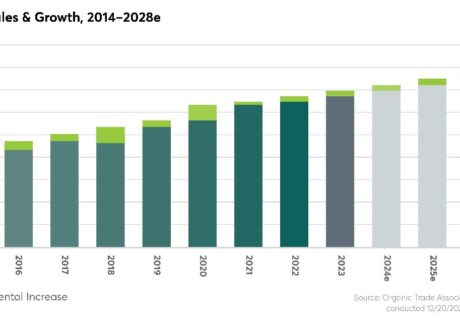The Prime Minister’s Farm to Fork Summit, held yesterday, heard that a push to help farmers restore nature and deliver healthier diets is required for the UK to realise true food security.
Soil Association Certification joined key food and farming businesses and groups at the summit held at Number 10 Downing Street, which brought the sector together to discuss the challenges it faces. The past two years have been difficult on farmers and food supply chains as they have dealt with a variety of factors, including: the impacts of the pandemic, cost-of-living crisis, Ukraine war and climate change with record-breaking droughts and floods.
Organic and nature-friendly farmers were represented at the summit by Soil Association Certification Chief Executive Dominic Robinson, who championed the vital role of wildlife and soils in delivering food security.
Speaking directly to Robinson, the Prime Minister recognised the importance of restoring soil health – which we depend on for 95% of food production – saying “it all starts with the soil”.
Speaking after the summit, Robinson said: “We were delighted to be part of the Prime Minister’s Farm to Fork summit today which was a much-needed recognition that despite our farmers’ best efforts, the British food system is in trouble. There was a real sense that government was listening.
“Climate change and the loss of biodiversity are the biggest threats to food security and farmers are already seeing how catastrophic drought and flooding can be for their crops, land and animals. If we want to truly secure our food supply, we need more nature-friendly and organic farming that works in harmony with wildlife. It’s clear the status quo of intensive farming is not achieving food security.
“Today we urged ministers to help more people to eat well with more, long-term support for farmers to shift to resilient practices that protect soils and don’t rely on harmful synthetic pesticides and fertilisers. By shifting to healthy and sustainable diets – with more fruit and veg and less meat produced to better standards – studies suggest that farming with organic principles can feed our population and slash farming emissions.
“The government’s push to back British farmers is welcome – they must now back British wildlife and healthy diets to deliver a sustainable, secure food system in the UK.”
The Soil Association is calling for:
Action on diets through schools and hospitals:
- The government spends £2.4 billion every year buying food – for schools, hospitals, the Armed Forces, prisons, and government offices. This must be diverted to put more British food, produced by nature-friendly and organic farmers, onto the public plate.
- The UK population isn’t eating enough fruit and vegetables: only 33% of adults and 12% of 11–18-year-olds are eating their 5-a-day. The cost-of-living crisis has reduced household purchases of vegetables to their lowest level in 50 years.
- This is having a devastating impact on public health – an estimated 31,000 premature deaths could be averted per year in the UK if everyone ate enough fruit and vegetables.
- Studies show that the Soil Association Food for Life Served Here scheme, which helps caterers to serve meals that are more sustainable, local and healthier, contributes a social return on investment of £4.41 for every £1 spent. Independent evaluation of Food for Life shows that if all schools in England followed this approach, a million more children would be eating their five-a-day.
Fair prices and more government support for nature-friendly and organic farming, including:
- Farming policies that optimise food production to solve the climate, nature and health crises – not policies that crudely maximise food production and reduce biodiversity, climate and nutrition security.
- More funds and ambitious targets for the Sustainable Farming Incentives. Existing incentives are a step in the right direction, but more is needed to spark transformative change across the UK and meet the Environment Act’s targets.
- Support and targets to end reliance on synthetic pesticides that drive wildlife declines and fossil fuel-based fertilisers, which are increasingly expensive and are often reliant on Russian supplies.
- Targets for boosting organic farming in England and Wales, following the lead being set by Scotland and in Europe. With 30% more species and healthier soils on organic farms, on average, this way of farming is a no brainer for governments to back.
- A land use framework to allow us to think about what we should do, and where. Some land may need to be used to manage excess rainfall, allowing other land to drain more rapidly, for instance, without the risk of flooding homes. It could also boost fruit and veg production and steer farming away from practices with a high risk of pollution, like planting maize in fields near to rivers on fields prone to flooding.
- Better farm data with monitoring and baselining on all the benefits farming can deliver – and on its environmental impacts. Supply chains and government are encouraged to take a holistic approach like the protocol used by Soil Association Exchange, which is being used by more than 500 farmers and focuses on six core themes of soil, water, biodiversity, carbon, animal welfare and social impact – including a metric on food production.
- Supply chain action – this can’t all be on government. If we want food to be grown here, we need to ensure the risks are shared through the supply chain. Supermarkets and large food manufacturers need to do more to help farmers transition.





